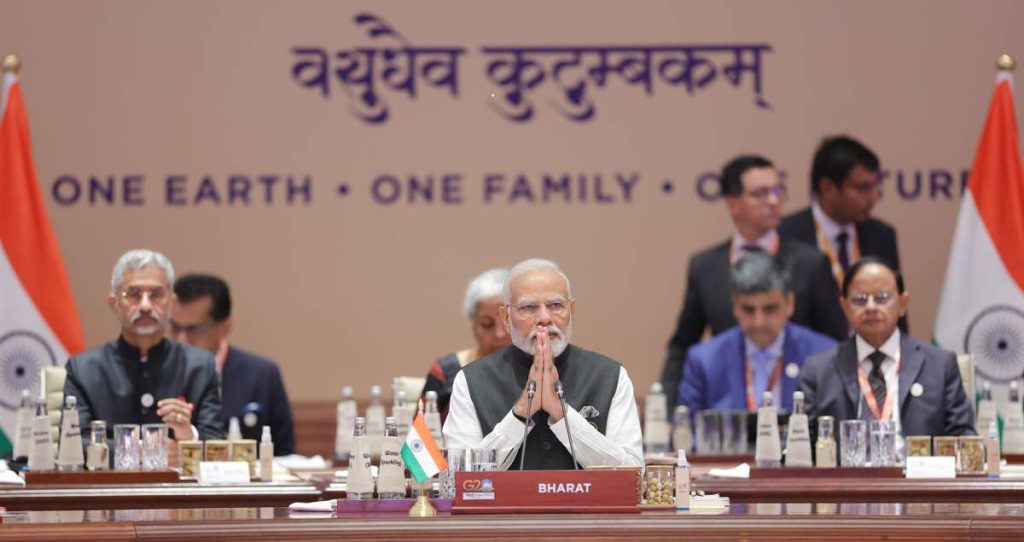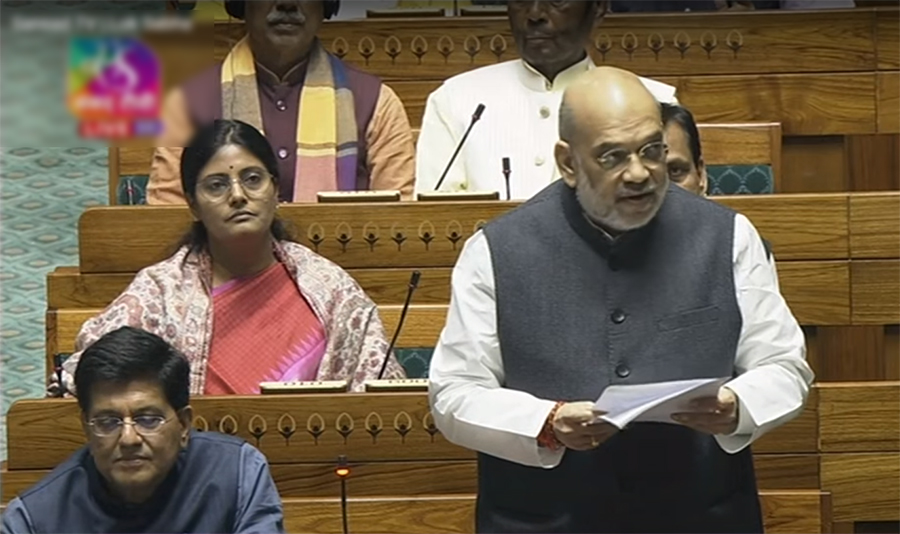In what came as a surprise to international observers, and as a testament to the success of India in uniting rather than dividing the group, the G20 annual document was unanimously approved in the New Delhi Summit…reports Asian Lite News
Success of the Indian Presidency in unifying the G20 behind the final communique conveys a message about the essentiality of including India as a Permanent Member of UNSC.
If 2020 saw the spread of the Covid-19 pandemic and 2022 the Russia-Ukraine war, 2023 has witnessed the eruption of hostilities between Israel and Hamas as a consequence of the latter’s 7 October attack within the Jewish state. Each of these “Black Swan” (un-anticipated) events created its own backlash in terms of both societal and economic turmoil, and Bharat was not spared.
The government led by Prime Minister Narendra Modi ramped up the production and dissemination of home-grown Covid-19 vaccines to a level that ensured that neither nationwide lockdowns nor vaccine mandates were required in 2021, while herd immunity was secured within the country by the close of that year. As for the war in Ukraine, Prime Minister Modi sought to insulate the economy from its shocks by taking advantage of the discounts that the Russian Federation was offering for its oil resources. Skillful diplomacy with the US and the EU, assisted by External Affairs Minister S. Jaishankar, ensured that Bharat escaped western sanctions on such purchases.
Once the Israel-Hamas war ensued, the official stance was clear. Terror had to be fought, but in a manner that minimises the risk of civilian casualties. New Delhi called for adequate supplies of essentials to be allowed to reach Gaza, so that the population in the strip was spared the full effects of the conflict. At the same time as such crises were being tackled, the trajectory of the G20 was placed in a much higher orbit during 2023, the year of the Indian Presidency. In particular, the concerns of the Global South were placed at the centre of activity of the nineteen largest economies of the world, together with the European Union, which will be joined by the African Union in 2024 as a consequence of the efforts of the 2023 G20 President, Prime Minister Narendra Modi. In a diplomatic feat, mutual adversaries such as Russia and the US came together in subscribing to the 2023 G20 final communique.
In what came as a surprise to international observers, and as a testament to the success of India in uniting rather than dividing the group, the G20 annual document was unanimously approved in the New Delhi Summit. Such unanimity was rare in the G20 since the premature replacement of Russian-speaking Ukraine President Viktor Yanukovych by a Russophobe, Petro Poroshenko, in 2014. The 2023 G 20 document contains a roster of recommendations and pathways for a better world based on the concept of a common future for humanity, that is enshrined in the concept of Vasudhaiva Kutumbakam.

INDIA WORKS TOWARDS UNITY
India’s success in uniting Russia, China, the US and other G20 members behind the final communique in the 2023 Summit was the consequence of apex-level discussions by Prime Minister Modi with other Heads of State and Government within what has become the most economically consequential group in the world. In a prominent example of a fractured organisation of international significance, the UNSC has during crisis after crisis thus far failed to unify around a single solution to crises such as the conflicts taking place in Ukraine and Gaza. The success of the Indian Presidency in unifying the G20 behind the final communique conveys a silent message about the essentiality of including the world’s most populous country within the roster of Permanent Members of the UN Security Council, an expansion that is being blocked by the PRC, the very country whose inclusion in the UNSC Permanent Membership was championed by India in the UN even when the two countries were at war with each other in 1962. The fear within the CCP is that the addition of India would add to the influence of New Delhi in world affairs. Such an expansion would benefit the Global South, which does not include the PRC and of which India is the champion.
The hypocrisy of the PRC despite its many official statements supporting the Global South has been revealed by its blocking of the inclusion of India in the list of Permanent Members of the UNSC. The expectation, however, is that by 2029, it will become impossible to ignore India’s claim, given the steadily declining importance of the UNSC except as an arena where shouting matches routinely take place between different P-5 members in particular.
The G20 meetings that were held during the Indian Presidency were in welcome contrast to such verbal warfare. Unlike in the past, efforts by the PLA to seize additional territory by stealth or force have been met with adequate resistance by the Indian side. Troop strength on the Sino-Indian border has been reinforced to meet any contingency, while additional Air Force and Navy units have been integrated into a master plan to deter (and if necessary to repel) any aggression by the PLA. Unlike in the past, when the Sino-Indian border was the focus of attention as a potential arena for PLA aggression, the searchlight has moved towards Taiwan, which is holding its Presidential elections on 13 January.
Irrespective of which party wins in that election, the people of Taiwan are almost unanimous in rejecting absorption into the PRC. The example of Hong Kong is vivid in Taiwanese minds, as the freedoms that were solemnly granted for the next fifty years to the residents of the HK Special Administrative Region by the CCP under General Secretary Jiang Zemin in 1997 were arbitrarily removed during 2019 by Xi Jinping. Today, Hong Kong is experiencing the same degree of control by Beijing as any other province in China, which is why all three Presidential candidates and two of the three Vice-Presidential candidates publicly oppose the absorption of Taiwan into the PRC.

BHARAT SHAKES OFF COLONIAL LEGACY
Meanwhile, Bharat i.e. India has emerged as a key alternative to companies seeking to relocate from China. Several colonial-era laws and regulations have during 2023 itself been thrown into the waste basket that ought to have been their receptacle in 1947 itself. These include the Indian Penal Code, the Code of Criminal Procedure and the Evidence Act, which have been replaced by constructs that take account of the changes that have come about not just since the 1800s (when the three colonial enactments were made) but in the 21st century, such as the ubiquity of digital modes of communication.
Since 2019 onwards, numerous colonial era laws and regulations have been removed and in the case of a few, replaced, all of which is making an impact on the attractiveness of Bharat, i.e. India as a place for domestic and international companies to do business. By 2029, it is expected that such processes would ensure that India emerges as the world’s third largest economy.
Apart from ensuring that Indian companies emerge as global brand leaders, and that corporates from countries as presently disparate as Russia and the US emerge as major investors in India, attention is being paid to the underprivileged. The all India effort led by Prime Minister Modi is designed to ensure that citizens of India living in the country (i) never go to bed hungry, (ii) each household has access to a smokeless kitchen, (iii) a toilet, and (iv) a dwelling that elements such as rain cannot enter. Above all, that (v) education and (vi) employment be provided across the spectrum of the population.
2024-2029 is the period when the plans are to ensure a breakthrough in living standards of all citizens in the same way that 2019-23 witnessed a breakthrough in the positioning of Bharat, i.e., India within the international community, and through that achievement, a breakthrough in the importance given by the major economies of the world to resolving issues that have long troubled the Global South. The central chord of the policy of Prime Minister Modi is to work towards creating a world order that is no longer unipolar but united.














